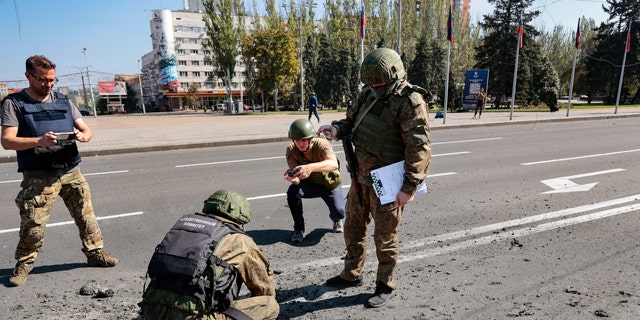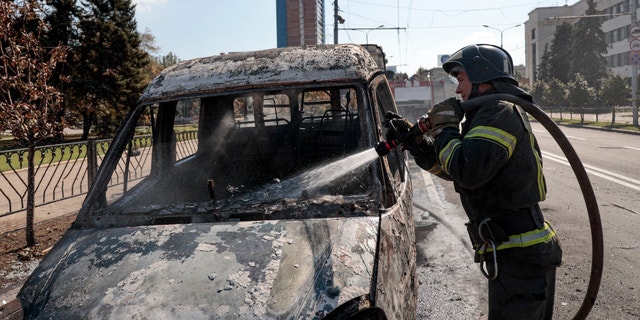Ukraine President Zelenskyy promises no ‘lull’ in taking back towns from Russia
Ukrainian President Volodymyr Zelenskyy promised his country there would be no letup in the counteroffensive that has reclaimed towns and cities from Russian troops, as shelling continued Sunday across a wide stretch of Ukraine.
Zelenskyy ran through a list of towns that Ukraine has taken back in its lightning push across the northeast.
“Maybe now it seems to some of you that after a series of victories we have a certain lull,” he said in his nightly video address. “But this is not a lull. This is preparation for the next series… Because Ukraine must be free — all of it.”
Ukraine’s military command said its forces secured the eastern bank of the Oskil River on Saturday. The river, which flows south from Russia into Ukraine, had been a natural break in the newly emerged front lines since Kyiv’s counteroffensive began.

RETIRED FLORIDA DOCTOR TRAVELS TO UKRAINE TO HELP INFANTS AND NEWBORNS IMPACTED BY RUSSIA’S INVASION
As Russian shells hit towns and cities over the weekend, the British defense ministry warned that Moscow is likely to increase attacks on civilian targets as it suffers battlefield defeats.
“In the last seven days, Russia has increased its targeting of civilian infrastructure even where it probably perceives no immediate military effect,” the ministry said in an online briefing. “As it faces setbacks on the front lines, Russia has likely extended the locations it is prepared to strike in an attempt to directly undermine the morale of the Ukrainian people and government.”
Russian fire killed four medics attempting to evacuate a psychiatric hospital in the Kharkiv region on Saturday, said governor Oleh Syniehubov. Two patients were wounded in the attack in Strelecha, he said.

Overnight shelling also hit a hospital in Mykolaiv, a significant Black Sea port, regional governor Vitaliy Kim said. And five people had died over the past day in Russian attacks in the Donetsk region, one of two Ukrainian regions that Russia recognizes as sovereign states, governor Pavlo Kyrylenko said.
The separatist forces that control much of Donetsk said Ukrainian shelling of a prisoner-of-war colony in Olenivka killed one prisoner and injured four. More than 50 POWs were reported killed in a July attack on the Olenivka prison; Russian and Ukrainian authorities blame each other.
A Washington-based think tank, the Institute for the Study of War, said Russian forces in Donetsk continue to conduct “meaningless operations” on villages as opposed to reinforcing the front line.
A top Vatican envoy and his entourage came under fire as they were distributing humanitarian supplies in Ukraine, the Vatican news service said on Sunday. It reported no injuries.
The incident took place near the city of Zaporizhzhia on Saturday, and forced Vatican Almoner Cardinal Konrad Krajewski and others to take cover.
“For the first time in my life, I didn’t know where to run. Because it is not enough to run, you have to know where to go,” said the Polish-born cardinal, whose office makes charitable contributions in the pope’s name.
TOP UKRAINE OFFICIAL SAYS 450 BODIES FOUND IN IZYUM MASS GRAVE, SOME WITH HANDS TIED BEHIND THEIR BACKS
Three people were wounded in nighttime shelling of Nikopol, across the river from Europe’s largest nuclear power station, said regional governor Valentyn Reznichenko. The six-reactor Zaporizhzhia Nuclear Power Plant was captured by Russian forces in March, but is operated by Ukrainian engineers. Its last reactor was switched off a week ago after repeated power failures because shelling put crucial safety systems at risk.
Meanwhile, prosecutors in Kharkiv are accusing Russia of torturing civilians in one village that was recently freed. In an online statement, they said they found a basement where Russian forces allegedly tortured prisoners in Kozacha Lopan, near the border with Russia.
In images they released, they showed a Russian military TA-57 telephone with additional wires and alligator clips attached to it. Ukrainian officials have accused Russian forces of using the Soviet-era radio telephones as a power source to shock prisoners during interrogation. It was not immediately possible to verify the Ukrainians’ claims.
The Associated Press contributed to this report.
Read the full article Here


